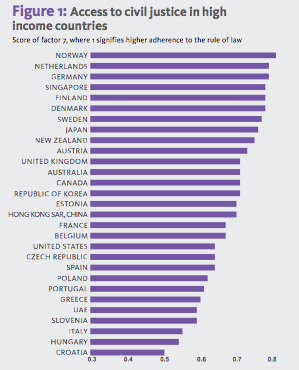Our civil justice system is found to lag behind in access for the poor.
The U.S. ranks 12th out of 16 countries in our regional group.
The World Justice Project leads a global movement to strengthen the rule of law for the development of communities of opportunity and equity. They recently released the Rule of Law Index 2012-2013 report, which covers 97 countries representing over 90 percent of the world’s population. The Rule of Law Index is a comprehensive quantitative assessment tool that examines 48 indicators for development of the rule of law – these indicators are organized around nine core concepts: (1) limited government powers, (2) absence of corruption, (3) order and security, (4) fundamental rights, (5) open government, (6) regulatory enforcement, (7) civil justice, (8) informal justice, and (9) the most important category for our work – civil justice.
The United States actually does well in most dimensions relating to the rule of law – the report finds we have a well-functioning system of checks and balances and respect for fundamental rights of association, express, and religion.

In the United States, low-income residents do not use the legal system because they cannot afford the cost of an attorney
However, while our civil justice system is independent and free of undue influence, the report states that it “lags behind in providing access to disadvantaged groups. Legal assistance is frequently expensive or unavailable, and the gap between rich and poor individuals in terms of both actual use of and satisfaction with the civil court system is significant. In addition there is a perception that ethnic minorities and foreigners receive unequal treatment.“
Our civil justice system also doesn’t fare well in a comparison to Finland on a rating of equal access to justice – meaning the ability of all people to seek and obtain effective remedies through accessible, affordable, impartial, efficient, effective and culturally competent institutions of justice. In Finland, most people tend to use formal dispute-resolution channels – regardless of their economic status. In stark contrast, in the United States, few low-income residents used the court system – and most did not take formal action to resolve their disputes. Over 80% low-income litigants in the U.S. did not seek legal assistance because they could not afford the cost of hiring an attorney.
Now, we know that this news is actually not so surprising. After all, if low-income residents had equal access to our civil justice system, then OneJustice wouldn’t need to exist! Our network faces this stark reality – and its serious implications for these communities that do not have affordable ways to resolve their disputes – every day. Many of our most troubling societal problems stem from the fact that low-income communities simply do not have the same level of access to the court systems – and therefore to justice – as higher income communities. Homelessness. Violence. Lack of stable child custody arrangements. Inability to enforce the most basic civil rights. Lack of access to education and employment.
So how do we react to this stark evaluation of our civil justice system? Can we use this ranking as a baseline for improvement? What additional strategies can we put into play to provide real access to justice for all Americans? What will the impact be of continued budget cuts to the civil courts here in California? What do YOU think? We need to hear YOUR reactions, ideas, suggestions – how do we move forward from here?
